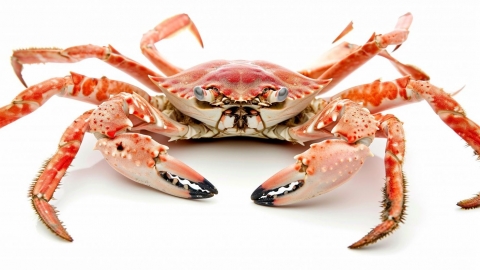What Should Not Be Eaten After Consuming Crab
Generally, after eating crabs, one should avoid consuming foods such as persimmons, strong tea, watermelon, loach, and lamb, and also avoid taking certain medications including ferrous sulfate tablets, norfloxacin capsules, furazolidone tablets, isoniazid tablets, and digoxin tablets. Detailed explanations are as follows:
1. Foods
1. Persimmon
Persimmons contain large amounts of tannic acid, while crabs are rich in protein. When consumed together, tannic acid combines with protein to form tannic acid-protein complexes that are difficult to digest, which may cause gastrointestinal discomfort symptoms such as nausea, vomiting, and abdominal pain. These complexes may also form solid masses in the gastrointestinal tract, affecting digestive function.
2. Strong Tea
Strong tea contains significant amounts of tannic acid, which can combine with the protein in crab meat to form precipitates that are difficult to absorb. This not only reduces the nutritional value of crab meat but may also increase the burden on the gastrointestinal tract, causing symptoms such as bloating and diarrhea. Additionally, tannic acid may interfere with the absorption of minerals like calcium present in crabs.

3. Watermelon
Watermelon has a cold nature, and crabs are also cold-natured foods. Consuming both together may lead to excessive accumulation of cold in the body, which can irritate the gastrointestinal tract, causing gastrointestinal spasms and symptoms such as abdominal pain and diarrhea. These symptoms are particularly noticeable in individuals with cold deficiency of the spleen and stomach.
4. Loach
From the perspective of food properties, loach is neutral in nature and has the effect of strengthening the body and boosting vital energy, while crabs are cold in nature. Their properties are opposite, and consuming them together may interfere with normal digestion and absorption in the body, potentially causing discomfort such as bloating and indigestion.
5. Lamb
Lamb is warm in nature and has a nourishing effect on the body, while crabs are cold in nature. Eating them together may create alternating hot and cold conditions in the body, irritating the gastrointestinal mucosa and causing gastrointestinal dysfunction, such as nausea, vomiting, and diarrhea. It may also reduce the nourishing effects of lamb.
2. Medications
1. Ferrous Sulfate Tablets
Ferrous sulfate tablets are commonly used iron supplements. Crabs contain significant amounts of tannic acid and calcium. Tannic acid can combine with iron to form insoluble iron tannate, and calcium may also interfere with iron absorption, thereby reducing the iron-supplementing effectiveness of ferrous sulfate tablets and affecting the treatment of conditions like anemia.
2. Norfloxacin Capsules
Norfloxacin capsules belong to the quinolone class of antibiotics. Crabs are rich in protein, and during digestion in the gastrointestinal tract, protein may affect the absorption rate and amount of norfloxacin, reducing the drug's bioavailability and thereby affecting its antibacterial and anti-inflammatory effects, which is unfavorable for the treatment of infectious diseases.
3. Furazolidone Tablets
Furazolidone tablets are nitrofuran-class antimicrobial agents. Histidine present in crabs may be converted into histamine in the body, and furazolidone inhibits the metabolism of histamine, leading to its accumulation. This may cause symptoms such as headache, dizziness, skin flushing, and palpitations, and in severe cases, difficulty breathing may occur.
4. Isoniazid Tablets
Isoniazid tablets are anti-tuberculosis medications. Crabs contain a certain amount of tyramine, and isoniazid inhibits the breakdown and metabolism of tyramine, causing it to accumulate in the body. This may lead to adverse reactions such as elevated blood pressure, headache, nausea, and vomiting, affecting the safety and effectiveness of anti-tuberculosis treatment.
5. Digoxin Tablets
Digoxin tablets belong to the cardiac glycoside class of medications, with a narrow therapeutic index between effective and toxic doses. Crabs contain significant amounts of calcium, which enhances the cardiotoxic effects of digoxin, potentially leading to digoxin toxicity, with symptoms such as arrhythmia, nausea, and vomiting, posing a serious threat to health.
When consuming crabs in daily life, one should eat in moderation and avoid excessive intake at one time. If taking any of the above medications due to health conditions, it is recommended to separate crab consumption and medication intake by at least 2-3 hours. When necessary, consult a physician or pharmacist to ensure medication safety and dietary health.







